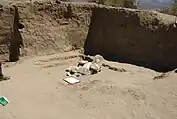Aquihuecó
Aquihuecó is an archaeological site in Argentina. It is located by the city of Chos Mahal in the Neuquén province of Argentina.[1][2] Aquihuecó is the biggest hunter-gatherer burial site in Patagonia.[3] The site is located on top of a mound in a dune and was utilized as an open-air burial site by prehistoric inhabitants of the land.[3][4] Archaeologists have excavated at least 65 human inhumations at the area. These burials were marked with either large stones or piles of small stones. Many of the graves contained burial goods such as stone pendants, grinding tools, sharp instruments, projectile points, milling tools,[4] lithic spheres,[5] and beads, necklaces, or earrings made from mollusc shells.[6] Some of the skulls found at the site display a circular or pseudocircular body modification of the cranial vault.[7] The site is dated to have been inhabited from around 5000 to around 3000 years before present.[5] Aquihuecó was first discovered in 1997 and began excavation in 2003.[3]

References
- Berón, Mónica Alejandra (2015-01-21). "Chronological distribution and disturbance factors to evaluate population dynamics in Western Pampas, Argentina". Quaternary International. Palaeodemography in Southern South America. 356: 74–88. doi:10.1016/j.quaint.2014.10.038. ISSN 1040-6182.
- Rindel, D. D.; Perez, S. I.; Barberena, R.; MacDonald, B. L.; Glascock, M. D. (2020). "Sources of obsidian artefacts, exchange networks and landscape use in Auca Mahuida (Neuquén, north‐western Patagonia)". Archaeometry. 62 (1): 1–21. doi:10.1111/arcm.12511. ISSN 0003-813X.
- Vazquez, Romina C.; Béguelin, Marien; Navarro, Tamara G.; Cerda, Ignacio A. (2021-09-29). "Bone histology of human remains from the Late Holocene of Northwestern Patagonia, Argentina: a multidimensional taphonomic approach". Archaeological and Anthropological Sciences. 13 (10): 175. doi:10.1007/s12520-021-01435-9. ISSN 1866-9565.
- Scabuzzo, Clara; Figueiro, Gonzalo; Gordón, Florencia (2019-12-13). Bioarcheology in Southern Cone of South America: The Pampas, Patagonia and Uruguay. ISSN 0081-0223.
- "A world history of tax rebellions: an encyclopedia of tax rebels, revolts, and riots from antiquity to the present". Choice Reviews Online. 41 (09): 41–5030-41-5030. 2004-05-01. doi:10.5860/choice.41-5030. ISSN 0009-4978.
- Gordillo, Sandra (2019). Archaeological records of Megalobulimus shells as artifacts in South America. ISSN 2055-7604.
- Bernal, Valeria; D́Abramo, Sergio; Gordón, Florencia; Gonzalez, Paula N.; Perez, S. Ivan (2020-12-01). "Mobility of human populations in the Curi Leuvú basin, Northwest Patagonia, during the Holocene: An approach based on oxygen isotopes". Journal of Archaeological Science: Reports. 34: 102636. doi:10.1016/j.jasrep.2020.102636. ISSN 2352-409X.